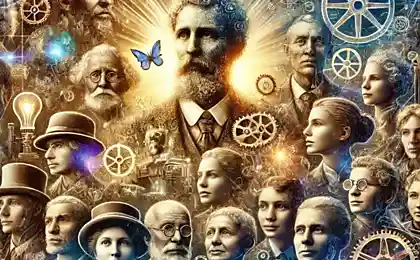626
Why is the safe path to success will not lead you to true happiness in business
The loss of the connection between business and science
For the above reasons the original idea of combining philosophical and business education seems strange. Recently, experts of the Carnegie Foundation for the advancement of the quality of education has considered the phenomenon of reflection in the life of modern entrepreneurs based on their daily tasks and routine. Every profession, including lawyers and doctors, is now in danger to be focused solely on their own skills and techniques. But if the sellers just needed to keep records and correspondence with suppliers, now there are many management models and tools that can learn and successfully use in work. Entrepreneurs have the time of Adam Smith (Scottish economist and philosopher of the XVIII century), it was time to mingle with the best minds and of the clergy. "The current business running like rats in a corporate wheel that spins in the vortices of the world wide web," writes Pierre de montaut Hye in an article in the Magazine Grasp. In his opinion, people in the mirrored skyscrapers easy to ignore issues that go beyond purely technical and operational tasks.
Reflection and contemplation are popped just from everyday life.But such a daily load is not the only threat. In the 20th century in the state, big companies and corporations included experts from different areas who have helped line managers with advice and recommendations. In the second half of the century the corporate pyramid collapsed and the smart people who were paid for an in-depth study of important issues, left the industry. The reduction in employees, who often had academic education, leveled the bond between business and scientific environment. At the same time in the U.S. rose by a huge debt bubble. As you know, in times when such bubbles burst, the loss of any ties between business and science. Contemporary philosophers have to deal with it.
Philosophy as the secret of successIn business and IT-environment there are specific examples that confirm the General hobby philosophy in favor of business. So Damon Horowitz quit IT to get a PhD, and believes that we should all do the same. In his speech at Stanford University in 2011, Horowitz told how he quit a job-related technology and received his doctorate in philosophy. "It was one of the best decisions of my life," shared Horowitz, whose example demonstrates that a degree in philosophy can be useful not only among academics. Knowledge of philosophy can pave the way for real changes in business and innovation. After Horowitz received his doctorate in philosophy at Stanford, he became an it entrepreneur and has achieved success as a full-time philosopher and a technical Director at Google. His career demonstrates the value of philosophical education.
Despite the growing number of students and interest in studying philosophy with the media, the subject itself is old-fashioned, impractical and far removed from everyday life. But in the world of business and technology, philosophy has proved not only its favor: it is often the cornerstone of great innovation. Philosophy and entrepreneurship surprisingly well suited to each other.
Many of the most successful tech-entrepreneurs and innovators have graduated from the philosophical faculties, and in consequence has applied critical thinking skills to create new digital services that meet certain needs of society. Edward tenner, the journalist of the edition "Atlantic", even called the philosophy "the most practical specialty." And Horowitz believes leaders of thought in the industry is not those who climbed slowly up the ladder, and those who took chances and developed unique direction. Reid Hoffman and Stewart Butterfield, founders of LinkedIn and Flickr, saying that studying philosophy was the secret of their success.
The old idealsas for the looks, still the purpose of the business philosophy can be interpreted as "thinking ideals". In the context of entrepreneurship, this task often involves an explanation of the concepts of "perfect control", "ideal organization" or "ideal market" from the point of view of philosophical doctrines. In this approach, the business education traditionally clings to those which they deliver these ideals. Thus, the economy and the identity of homo economicus is based on the model, which proclaims the rationality of choice and decision-making. Thus, the traditional ideas of business organization can be based on the assumption that it is not only possible, but normal to want to create companies where the mind is placed above all else.
In his fascinating book, Nicole Dewandre, civil servant of the European Union, reflects on the practical effect of such ideals. Based on the philosophical opinions that are different from the above, it concludes that the latter are not only useless but even harmful. Devendra believes that if we will daily approach to business, keeping in mind only rationality, we will sooner or later become disillusioned cynics. She explains that our real life experiences and everything happening around does not fit with what we were taught. In the end this discrepancy forces us not only to abandon their ideals, but to stop believing in the existence of truth that makes us opportunists. We give ourselves fully to the dynamics of the market and reaffirm the cynicism of the time in which we live.
The desire for success as for failurethe Key idea of avoiding business philosophy which is based solely on the ideals suggested to scientists the same the Carnegie Foundation. The concept is the source of knowledge: we must receive them not from a hypothetical perfection, and the reality that surrounds us. In particular, the authors of the report propose to define crises and defaults as a "learning situation". "Today, financial and environmental crises are not mentioned in educational programs, but we experience it in the order of things: business education is still entirely based on the concept of success," says Professor de montaut.
If we approach business education only from the point of view of what brings success in business, we hardly manage to perceive their mistakes, shortcomings and problems, much less financial crisis as moments of learning. This view is confirmed by Paul Shrivastava and Matt Statler, the authors of the book "Learning on the global financial crisis" (Learning from the Global Financial Crisis: Creatively, Reliably, Sustainably, 2011). Of course, when bookshelves are full of advice and tips on how to become a successful Manager, head of Department, Director of the company, or simply to achieve success in all difficult to put this idea to criticism, that you have not considered the destroyer of General fun. No one wants to hear that questioned further relaxed learning, while business students might reasonably require to return your money back.

Of Aristotle and John Dewey, American philosopher-pragmatist, we know that true learning and reflection are based on the experiments, especially on the bad. This philosophical approach: the man gets a chance to understand who he is and how he behaves, if something goes wrong.
You can truly understand that healthy only if ever anything was sick.This insight is the most banal and familiar to other professionals. Lawyers learn the law, based on the crimes of the doctors trying to cure diseases. But the one profession abandons this fundamental truth. She is so obsessed with his fame that is doing everything possible to hide from life's lessons. The worst enemy of a businessman, because of which it ceases to break through your own boundaries and reflect, is a total focus on success.
Philosophy of failuresThus, we need a philosophy that is based on our failures and is able to translate real business experience from which to draw knowledge. Failure is a much broader topic in philosophy than success. Failures are associated with tragedies, those with life crises that lead to Central idea of existentialism. The result of this reflection is the conclusion that the capitalist system is much more dependent on failure than from success. It must be remembered that modern capitalism could not develop without the bankruptcy laws and limitations of responsibility of enterprises. Its development to a lesser extent, suggests a safe path to success, but it means the adoption of restrictions and search of legal, social and philosophical ways around them. Any new business philosophy should be based on concept of failure and experience a bad experience and not on the cynical ideal of success.
So why specialists with a philosophical education will soon become the entrepreneurs who set the tone for the business?
Philosophy develops critical thinking skills and entrepreneurial flair
Philosophy — one of the most difficult professions. Strict standards of writing and reasoning help students to learn critical thinking skills that are useful in a variety of professions. The ability to think critically, perhaps, gives a special advantage for the IT entrepreneurs.
"Open assignments force the students-philosophers to find a unique aspect of the work of the philosopher they are studying, or original to link the two thoughts of different thinkers," writes Christina Nesselrode, Director of innovation of the Wellington International school in Dubai. "Likewise, entrepreneurs should be able to find and understand the unique opportunities in existing markets."
"I think that if you have a good understanding of what it is to be human, understanding of life, culture and society, it will provide a better perspective when creating a business, rather than pure business education," says Flickr co-founder Stewart Butterfield, who received a bachelor's degree and master of philosophy at the University of Victoria and Cambridge, where he studied philosophy of the mind. According to him, you will always have the opportunity to learn to strike a balance and consider the profit, while other things are harder to grab on the fly.
Graduates-philosophers create trends in the world of technology
"I originally planned to become an academician," said co-founder Linked.In Reid Hoffman in an interview with Wired. He won a Marshall scholarship and read philosophy at Oxford. Hoffman wrote books and essays that help readers to understand what they want to be, and tried to develop the intellectual culture of the society. When Hoffman realized that staying in the academic world, he will not have sufficient funds to leave the world of the desired imprint, he decided to become a developer. Now he uses the skill of critical thinking, developed during the study of philosophy, to invest for profitable investments in technology start-UPS.
Philosophers will be the ones who will solve the biggest issues of his generation
Breakthroughs in physics, technology and neuroscience are always asking about the nature of the world and man's place in it. In addition, there remain questions of morality and meaning, which arose in ancient times: how we should treat each other, what it means to live a good life and so on.
At Princeton University believe that because philosophers have a better understanding of human nature, they are better able to understand the problems of modern society. "Philosophy can help us to identify existential problems that the world faces today, but only if we return it from the far corner, and begin to actively apply into business" — wrote in 2010, Dov Seidman, author of "HOW: why HOW we do anything means everything".
Philosophy students — citizens of the world
In times of global economy, when business begins to understand social responsibility and to take care of common problems, something do change will people who are able to think critically. Rebecca Newberger Goldstein, philosopher, novelist and author of "Plato in the GooglePlex", said recently that the study of philosophy make students "global citizens". She explains why students should study philosophy, despite their worries about future employment that philosophy makes life much more interesting and every day helps in matters of moral choice.
Such global thinking and humanistic point of view can make you even more desired candidate for a particular position. "You learn in the Humanities to pursue your intellectual passions, but accidentally become a desirable asset in the tech industry," says Horowitz. "This is the halo of human flourishing".
Source: theoryandpractice.ru
For the above reasons the original idea of combining philosophical and business education seems strange. Recently, experts of the Carnegie Foundation for the advancement of the quality of education has considered the phenomenon of reflection in the life of modern entrepreneurs based on their daily tasks and routine. Every profession, including lawyers and doctors, is now in danger to be focused solely on their own skills and techniques. But if the sellers just needed to keep records and correspondence with suppliers, now there are many management models and tools that can learn and successfully use in work. Entrepreneurs have the time of Adam Smith (Scottish economist and philosopher of the XVIII century), it was time to mingle with the best minds and of the clergy. "The current business running like rats in a corporate wheel that spins in the vortices of the world wide web," writes Pierre de montaut Hye in an article in the Magazine Grasp. In his opinion, people in the mirrored skyscrapers easy to ignore issues that go beyond purely technical and operational tasks.
Reflection and contemplation are popped just from everyday life.But such a daily load is not the only threat. In the 20th century in the state, big companies and corporations included experts from different areas who have helped line managers with advice and recommendations. In the second half of the century the corporate pyramid collapsed and the smart people who were paid for an in-depth study of important issues, left the industry. The reduction in employees, who often had academic education, leveled the bond between business and scientific environment. At the same time in the U.S. rose by a huge debt bubble. As you know, in times when such bubbles burst, the loss of any ties between business and science. Contemporary philosophers have to deal with it.
Philosophy as the secret of successIn business and IT-environment there are specific examples that confirm the General hobby philosophy in favor of business. So Damon Horowitz quit IT to get a PhD, and believes that we should all do the same. In his speech at Stanford University in 2011, Horowitz told how he quit a job-related technology and received his doctorate in philosophy. "It was one of the best decisions of my life," shared Horowitz, whose example demonstrates that a degree in philosophy can be useful not only among academics. Knowledge of philosophy can pave the way for real changes in business and innovation. After Horowitz received his doctorate in philosophy at Stanford, he became an it entrepreneur and has achieved success as a full-time philosopher and a technical Director at Google. His career demonstrates the value of philosophical education.
Despite the growing number of students and interest in studying philosophy with the media, the subject itself is old-fashioned, impractical and far removed from everyday life. But in the world of business and technology, philosophy has proved not only its favor: it is often the cornerstone of great innovation. Philosophy and entrepreneurship surprisingly well suited to each other.
Many of the most successful tech-entrepreneurs and innovators have graduated from the philosophical faculties, and in consequence has applied critical thinking skills to create new digital services that meet certain needs of society. Edward tenner, the journalist of the edition "Atlantic", even called the philosophy "the most practical specialty." And Horowitz believes leaders of thought in the industry is not those who climbed slowly up the ladder, and those who took chances and developed unique direction. Reid Hoffman and Stewart Butterfield, founders of LinkedIn and Flickr, saying that studying philosophy was the secret of their success.
The old idealsas for the looks, still the purpose of the business philosophy can be interpreted as "thinking ideals". In the context of entrepreneurship, this task often involves an explanation of the concepts of "perfect control", "ideal organization" or "ideal market" from the point of view of philosophical doctrines. In this approach, the business education traditionally clings to those which they deliver these ideals. Thus, the economy and the identity of homo economicus is based on the model, which proclaims the rationality of choice and decision-making. Thus, the traditional ideas of business organization can be based on the assumption that it is not only possible, but normal to want to create companies where the mind is placed above all else.
In his fascinating book, Nicole Dewandre, civil servant of the European Union, reflects on the practical effect of such ideals. Based on the philosophical opinions that are different from the above, it concludes that the latter are not only useless but even harmful. Devendra believes that if we will daily approach to business, keeping in mind only rationality, we will sooner or later become disillusioned cynics. She explains that our real life experiences and everything happening around does not fit with what we were taught. In the end this discrepancy forces us not only to abandon their ideals, but to stop believing in the existence of truth that makes us opportunists. We give ourselves fully to the dynamics of the market and reaffirm the cynicism of the time in which we live.
The desire for success as for failurethe Key idea of avoiding business philosophy which is based solely on the ideals suggested to scientists the same the Carnegie Foundation. The concept is the source of knowledge: we must receive them not from a hypothetical perfection, and the reality that surrounds us. In particular, the authors of the report propose to define crises and defaults as a "learning situation". "Today, financial and environmental crises are not mentioned in educational programs, but we experience it in the order of things: business education is still entirely based on the concept of success," says Professor de montaut.
If we approach business education only from the point of view of what brings success in business, we hardly manage to perceive their mistakes, shortcomings and problems, much less financial crisis as moments of learning. This view is confirmed by Paul Shrivastava and Matt Statler, the authors of the book "Learning on the global financial crisis" (Learning from the Global Financial Crisis: Creatively, Reliably, Sustainably, 2011). Of course, when bookshelves are full of advice and tips on how to become a successful Manager, head of Department, Director of the company, or simply to achieve success in all difficult to put this idea to criticism, that you have not considered the destroyer of General fun. No one wants to hear that questioned further relaxed learning, while business students might reasonably require to return your money back.

Of Aristotle and John Dewey, American philosopher-pragmatist, we know that true learning and reflection are based on the experiments, especially on the bad. This philosophical approach: the man gets a chance to understand who he is and how he behaves, if something goes wrong.
You can truly understand that healthy only if ever anything was sick.This insight is the most banal and familiar to other professionals. Lawyers learn the law, based on the crimes of the doctors trying to cure diseases. But the one profession abandons this fundamental truth. She is so obsessed with his fame that is doing everything possible to hide from life's lessons. The worst enemy of a businessman, because of which it ceases to break through your own boundaries and reflect, is a total focus on success.
Philosophy of failuresThus, we need a philosophy that is based on our failures and is able to translate real business experience from which to draw knowledge. Failure is a much broader topic in philosophy than success. Failures are associated with tragedies, those with life crises that lead to Central idea of existentialism. The result of this reflection is the conclusion that the capitalist system is much more dependent on failure than from success. It must be remembered that modern capitalism could not develop without the bankruptcy laws and limitations of responsibility of enterprises. Its development to a lesser extent, suggests a safe path to success, but it means the adoption of restrictions and search of legal, social and philosophical ways around them. Any new business philosophy should be based on concept of failure and experience a bad experience and not on the cynical ideal of success.
So why specialists with a philosophical education will soon become the entrepreneurs who set the tone for the business?
Philosophy develops critical thinking skills and entrepreneurial flair
Philosophy — one of the most difficult professions. Strict standards of writing and reasoning help students to learn critical thinking skills that are useful in a variety of professions. The ability to think critically, perhaps, gives a special advantage for the IT entrepreneurs.
"Open assignments force the students-philosophers to find a unique aspect of the work of the philosopher they are studying, or original to link the two thoughts of different thinkers," writes Christina Nesselrode, Director of innovation of the Wellington International school in Dubai. "Likewise, entrepreneurs should be able to find and understand the unique opportunities in existing markets."
"I think that if you have a good understanding of what it is to be human, understanding of life, culture and society, it will provide a better perspective when creating a business, rather than pure business education," says Flickr co-founder Stewart Butterfield, who received a bachelor's degree and master of philosophy at the University of Victoria and Cambridge, where he studied philosophy of the mind. According to him, you will always have the opportunity to learn to strike a balance and consider the profit, while other things are harder to grab on the fly.
Graduates-philosophers create trends in the world of technology
"I originally planned to become an academician," said co-founder Linked.In Reid Hoffman in an interview with Wired. He won a Marshall scholarship and read philosophy at Oxford. Hoffman wrote books and essays that help readers to understand what they want to be, and tried to develop the intellectual culture of the society. When Hoffman realized that staying in the academic world, he will not have sufficient funds to leave the world of the desired imprint, he decided to become a developer. Now he uses the skill of critical thinking, developed during the study of philosophy, to invest for profitable investments in technology start-UPS.
Philosophers will be the ones who will solve the biggest issues of his generation
Breakthroughs in physics, technology and neuroscience are always asking about the nature of the world and man's place in it. In addition, there remain questions of morality and meaning, which arose in ancient times: how we should treat each other, what it means to live a good life and so on.
At Princeton University believe that because philosophers have a better understanding of human nature, they are better able to understand the problems of modern society. "Philosophy can help us to identify existential problems that the world faces today, but only if we return it from the far corner, and begin to actively apply into business" — wrote in 2010, Dov Seidman, author of "HOW: why HOW we do anything means everything".
Philosophy students — citizens of the world
In times of global economy, when business begins to understand social responsibility and to take care of common problems, something do change will people who are able to think critically. Rebecca Newberger Goldstein, philosopher, novelist and author of "Plato in the GooglePlex", said recently that the study of philosophy make students "global citizens". She explains why students should study philosophy, despite their worries about future employment that philosophy makes life much more interesting and every day helps in matters of moral choice.
Such global thinking and humanistic point of view can make you even more desired candidate for a particular position. "You learn in the Humanities to pursue your intellectual passions, but accidentally become a desirable asset in the tech industry," says Horowitz. "This is the halo of human flourishing".
Source: theoryandpractice.ru
5 Golden commandments of Oriental medicine
The dark side of Buddhism - 6 myths about this supposedly "good" religion























